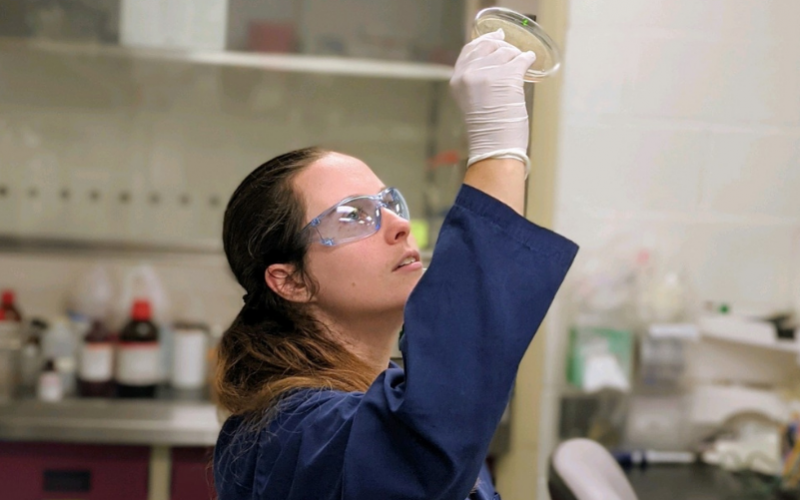Meet Haley Caldwell: PhD Candidate in Biomedical Sciences

Haley Caldwell is a PhD candidate in Biomedical Sciences at the University at Albany. Her Master’s thesis, completed under the guidance of Kirsten St. George, resulted in the development of a whole genome sequencing protocol for mumps virus samples that is still in use. Now, she studies flaviviruses in Alexander T. Ciota’s lab at the New York State Department of Health.
Conducting Research
Flavivirus is a genus of arthropod-borne viruses. They result in 50-100 million infections annually and cause emerging infectious diseases such as Zika virus and West Nile virus. Zika virus gained significant attention in 2013 after a large outbreak in French Polynesia, and then again in 2015 after a large outbreak in Brazil that was soon followed by a reported association between Zika virus infection and microcephaly.
“Increasing globalization, international transportation and urbanization have been implicated in the emergence of flaviviruses,” says Caldwell. “As these factors, and potentially climate change, alter flavivirus vector range, geographic expansion of arboviruses remains a public health threat. In addition, there is a lack of available post-exposure treatment options. There are currently no approved antiviral drugs for flaviviruses.”
In the lab, Caldwell works to understand the mechanisms of host-specific adaption for flaviviruses. Her doctoral research focuses on the NS3 and NS5 proteins of the flaviviral replicase. In the long term, a better understanding of adaption can help identify novel drug targets and foster the development of new antiviral therapies.
Generating Publications
To date, Caldwell’s research has resulted in two publications, which can be found in the Journal of General Virology and Genes. The first focused on how fidelity of the flavivirus replicase impacts the ability of West Nile virus to adapt to various host cell lines, and the second revealed that overall diversity in NS3 and NS5 differs significantly between hosts with higher diversity overall in avian hosts.
“My second publication also revealed that consensus level analysis of whole genome sequencing data to determine diversity misrepresents both patterns of diversity and host specific differences in hosts,” says Caldwell. “This discovery has far reaching implications in the interpretation of publications using only consensus level diversity as well as suggesting that minority level diversity needs to be utilized in the generation of antivirals, otherwise drug may not target conserved regions within the virus.”
Mentoring Students
Caldwell is pursuing an academic career, and as a future professor she hopes to foster the next generation of scientists through close mentorship.
“The combination of my desire to contribute to the field of public health and to teach are what shaped my goal to become an academic researcher. This desire stemmed both from a love of sharing knowledge and from the rampant and widespread misconceptions stymieing public health efforts,” says Caldwell.
Caldwell is also passionate about helping young scientists thrive personally and professionally despite any mental health obstacles they may face - and hopes that she can serve as a role model. She chose not to disclose her disability throughout her training, and this experience has helped her pinpoint how she wants to be as a professor. “I hope to dispel current notions regarding the fitness of those with mental illness in STEM fields,” she says.
Empowering Women in Science
“As a female in STEM, I also want to help pave the way for future women in science by addressing pressing issues including the wage gap, different expectations of male and female professors, discrimination, maternity and paternity leave, sexual harassment and microaggressions,” says Caldwell, who served as a founding member of Scientista at UAlbany.
Scientista helps empower women in science through career opportunities.
“Some of our recent events included a workshop on writing research papers, a panel showcasing different career opportunities from women in the field, and a movie screening of a climate change documentary for earth day,” Caldwell notes.


